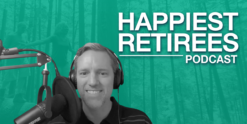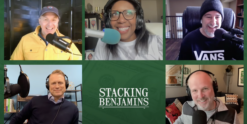How are you coping and staying busy in Quarantine? Help us help you by taking our survey.
Words matter. The language we use to describe a situation can dramatically affect perceptions and outcomes. Take, for example, a phrase that’s currently on everyone’s lips – “social distancing.”
I think that’s a dangerous term that should be replaced with the far more precise “physical distancing.”
Social distancing suggests that we should isolate ourselves from our social circles – family, friends and acquaintances. Our public health leaders were well-intentioned when they started preaching social distancing to fight the spread of COVID-19.
But as the battle wears on, we risk another widespread health crisis spawned by the isolation many people are experiencing as they heed the government’s call to avoid interaction with other people – the dangers associated with social isolation.
The Money Matters team has long been aware of the importance of social connection in retirement.
In my own research into the secrets of a happy retirement, I discovered that the happiest retirees typically have several “core pursuits” – activities or hobbies about which they are passionate.
On top of the list is tennis, a game that is tied to increased longevity. You typically play with three others for a doubles match. It’s an incredibly social game. Other popular core pursuits range from golf to tutoring to choir to the Lions Club and provide retirees with frequent, regular interaction with others and strong social circles.
Indeed, these happy retirees can’t get enough of other people. They often exercise in groups, whether hiking, biking, walking or running. They travel with friends and visit with family – happy retirees love spending time with their grandkids. And, attending church is often another centerpiece of these folks’ lives.
The unhappy retirees? Well, they tend to have few, if any, core pursuits. That’s one reason their social interaction tends to be limited.
This is why I have long encouraged people to identify their passions and hobbies before retirement. Core pursuits and social interaction are vital to maintaining our mental and physical health in the post-career years.
Our government’s response to COVID-19 has left most of us in social isolation.
For months, we’ve been relegated to our homes to stay safe. The result? True, interpersonal social contact has dropped to nil for the vast majority of us.
And, there’s no question that social isolation poses serious health risks. There are literally dozens of scientific studies that prove the dangers of limited social contact and loneliness.
The most often cited research on social isolation is a 2015 study by a team of Brigham Young University (BYU) researchers. In their study, the scientists analyzed 70 prior studies on the health impact of social isolation.
“Social connections, or the lack thereof, can influence health and the risk of mortality,” say the researchers. The BYU team defined social isolation as a “pervasive lack of social contact or communication, participation in social activities, or having a confidant.” They went on to describe socially isolated people as those who live alone, have few social network ties, or have infrequent social contact.
The BYU team carefully examined these 70 previous reports, which were conducted between 1980 and 2014. From their analysis, the BYU researchers concluded: “Substantial evidence now indicates that individuals lacking social connections… are at risk for premature [death]. The risk associated with social isolation and loneliness is comparable with well-established risk factors for [early death],” including obesity, substance abuse, mental illness, injury and violence, poor environmental quality, lack of immunization, and limited access to health care.
Social isolation is that serious to our health. We knew it wasn’t good for us, but the BYU study puts numbers to the threat – isolated people face a 29% higher risk of dying early as compared to their socially connected peers.
Isolation also takes a toll on one’s quality of life. The BYU study confirmed that social isolation is associated with adverse health behaviors, including smoking, physical inactivity and poor sleep. The socially isolated also suffer more emotional and psychological problems.
But while social isolation is often portrayed as primarily an issue of aging, it can take a toll on people of all ages, according to the BYU report.
“The data… should make researchers call into question the assumption that social isolation among older adults places them at greater risk compared with social isolation among younger adults,” said the BYU team. “Using the aggregate data, we found the opposite to be the case. Middle-age adults were at greater risk of mortality when lonely or living alone than when older adults experienced those same circumstances.”
In other words, our entire shelter-at-home nation is currently at risk for the health issues associated with social isolation.
How do we change this intolerable situation?
By changing our words. Let’s ditch “social distancing,” with all the guilt and paranoia it generates, and focus on “physical distancing.”
Public health doesn’t demand we not see our friends. It simply requires that we stay a minimum of 6 feet away from them when we get together.
Once we adopt that very practical perspective and the term physical distancing, a world of social opportunities opens up. Think of all the fun you and your crew can have while maintaining a healthy physical distance.
Golf – The perfect pandemic game. Heck, in normal times, you spend most of your time away from the rest of your foursome. That’s especially true if you spend as much time in the rough as I do!
Exercise – Ditch the gym and exercise in the park. Maybe you could organize a boot camp workout group for your friends?
Happy Hours – If your keep the crowd to under ten people, there should be no problem physical distancing in your front yard or backyard while sipping cocktails, comparing quarantine haircuts and sharing a laugh or two.
If you were to engage in any or all of these three examples (or other similar activities) and feel no guilt in socializing (despite the word social having its worst rap in a century), then I think we can start to really fight against social isolation. In fact, we could begin to maintain happy relationships in retirement despite living in quarantine.
Even when the current emergency is over, we will still face the threat of a virus spike and another resulting lockdown. So, understanding how to use physical distancing while remaining socially connected could be an essential skill for the next couple of years. In fact, permanently maintaining some of these physical distancing measures makes sense from a public health perspective.
America is a massive country with lots of space. Let’s get outside and use it – safely and together.
How are you coping and staying busy in Quarantine? Help us help you by taking our survey.














